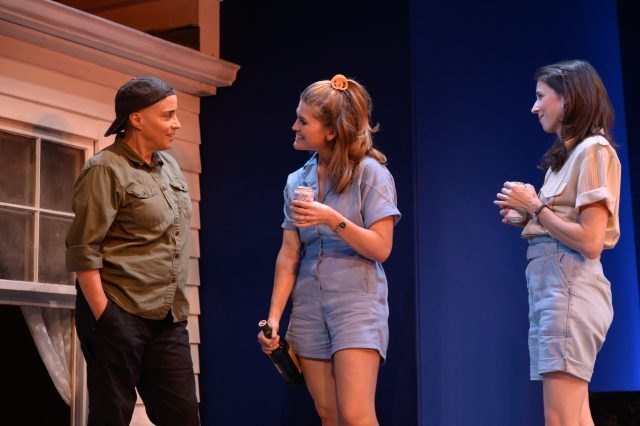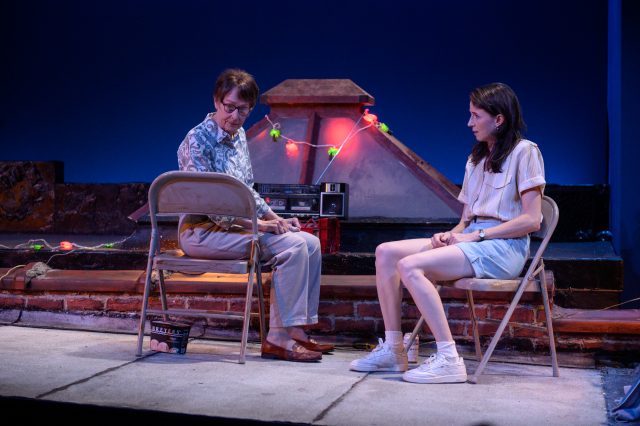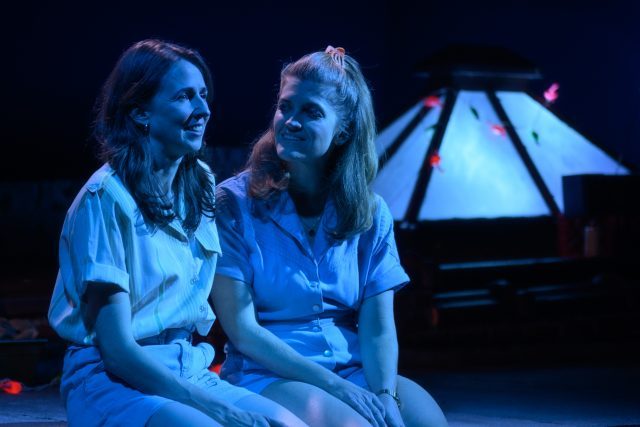
Meg (Marga Gomez), Matilda (Erin Markey), and Harriet (Kristen Sieh) hang out on a roof in Liza Birkenmeier’s Dr. Ride’s American Beach House (photo by Ben Arons Photography)
Ars Nova at Greenwich House
27 Barrow St. at Seventh Ave. South
Monday – Saturday through November 23, $35-$65
arsnovanyc.com
Liza Birkenmeier’s Dr. Ride’s American Beach House lands at a rather fortuitous moment in time. On October 18, astronauts Christina Koch and Jessica Meir completed the first all-woman spacewalk in history. The play, which opened tonight at Ars Nova at Greenwich House, takes place on June 17, 1983, the night before astronaut and physicist Dr. Sally Ride becomes the first American woman in space, aboard the Challenger shuttle. Dr. Ride was not initially part of the narrative; Birkenmeier originally intended to make a grand epic disproving the scientific method but instead concentrated on one scene, set on June 17, 1983, and only discovered later, after the work was already under way, that it had the connection to Dr. Ride, altering the plot significantly.
Best friends Matilda (Erin Markey) and Harriet (Kristen Sieh) are drinking, smoking, and gossiping on the roof of Harriet’s apartment building in St. Louis, supposedly a meeting of the Two Serious Ladies Book Club, which has nothing to do with literature but is just an excuse for the two of them to hang out. Matilda, who occasionally breaks into song, is married to Arthur and has two children, while Harriet, who writes poetry, is living with her boyfriend, Luke. Their main rule is to never discuss men while on the roof, but they can’t help themselves, especially since Harriet has an incredible story to tell about a one-night stand she just had with a biker, something she has never done before. “I don’t want to break the rule, but let’s talk about this through my perspective,” Harriet explains. “He is an object and I am the subject. He is the, the, commodity and I’m the . . .” It might not pass the Bechdel test, but it still keeps the women in charge.

Norma (Susan Blommaert) finds something to complain about to Harriet (Kristen Sieh) in Ars Nova premiere (photo by Ben Arons Photography)
They are soon joined on the roof — superbly designed with a cool slant and little in the way of safety by Kimie Nishikawa — by Matilda’s friend Meg (Marga Gomez), a butch, stout lesbian in boots, a baseball cap, and a Motörhead T-shirt. “Do you have a husband?” an oblivious Harriet asks Meg, who replies definitively, “Of course not.” Meg is bold and direct, open and honest. “Do you hate men?” Harriet asks, referring to a comment Meg makes regarding her job as a nurse. “No no, I don’t hate men; they only make me homicidal. I’ll be fine,” Meg answers. Meanwhile, hovering about is the persnickety Norma (Susan Blommaert), who is making sure that the building is run as efficiently as possible. As the long countdown begins for Dr. Ride’s journey into space — she is spending the night in NASA’s historic Florida beach house, where the astronauts have a barbecue before blasting off the planet — the four women continue to chatter away as Meg suspects that Harriet and Matilda don’t even realize that they are in love with each other.
Smartly directed by Katie Brook (How to Get into Buildings, She Is King) with a keen sense of humor and suggestive sexuality, Dr. Ride’s American Beach House incorporates the scientific method through exploration, observation, and testing. The all-woman cast and crew have a firm grasp of the material, which subtly takes on gender roles, societal expectations, sex, love, and power. It’s no coincidence that the two main characters are named after heroic female figures from children’s literature, Harriet the Spy and Roald Dahl’s magical Matilda. The two women are obviously in love with each other — Matilda calls Harriet “cupcake” and “pookie” — but are unable to understand what that even means, as they are stuck in traditional modes of thought involving the battle of the sexes, despite all that’s happening around them. Harriet uses binoculars while up on the roof — evoking Dr. Ride out in space, using a telescope — but while she peers longingly at a fashionable kitchen across the way, Meg sees a hapless man trying to kill a bug in his bedroom, criticizing his lack of skills in bed. In a reverse Samson and Delilah, Harriet decides to give up her firm control over the biker after he shaves off his facial hair; as opposed to him losing strength, she loses interest.

Besties Harriet (Kristen Sieh) and Matilda (Erin Markey) are rooting for Dr. Sally Ride in Liza Birkenmeier’s new play (photo by Ben Arons Photography)
Despite how funny the ninety-minute play is — and it’s very funny — a bittersweet edge hangs in the air. Dr. Ride died of pancreatic cancer in 2012 at the age of sixty-one, and her relationship first with Molly Tyson in the early 1980s and then with her longtime partner, Tam O’Shaugnessy, only came to light after her death, in her obituary; she was unable to come out during her lifetime. And less than three years after her trip into space, the very same Challenger space shuttle she flew in broke apart in the air, killing all seven people on board, including thirty-seven-year-old high school teacher Christa McAuliffe. But Birkenmeier’s (littleghost, The Way Out West) poetic yet realistic dialogue — the actors frequently hesitate, repeat words, and speak in incomplete sentences — and the engaging performances by Gomez (Latin Standards, Pound), Sieh (RoosevElvis, The Band’s Visit), and Markey (Singlet, A Ride on the Irish Cream) make this more than just another theatrical ride through the contemporary female psyche, in space and on a St. Louis rooftop.